Physical Address
304 North Cardinal St.
Dorchester Center, MA 02124
Physical Address
304 North Cardinal St.
Dorchester Center, MA 02124
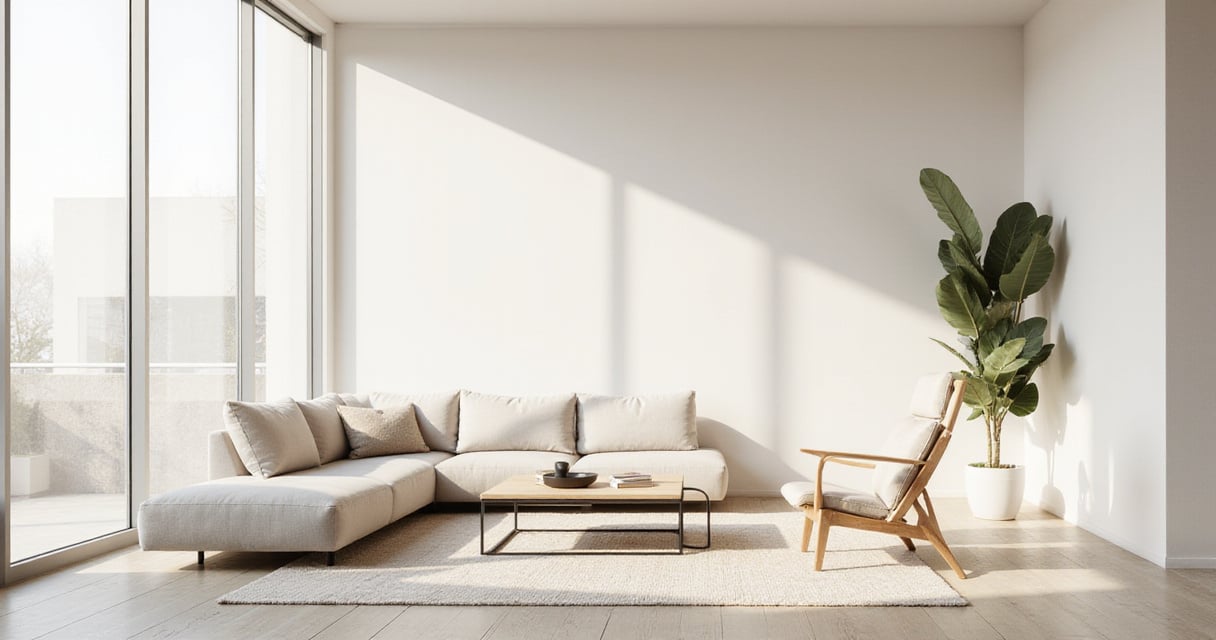
Transform your space with these 19 modern living room ideas that blend clean lines, smart technology, and thoughtful design. Create a stylish, functional room that reflects your lifestyle.
Let’s be honest. We hear “modern living room” and most people think of cold, sterile spaces from a design magazine—places you can’t really live in. But that’s not what I see. As someone who spends their days designing spaces that fuel healthy lifestyles, I see the living room as one of the most powerful tools for your well-being. It’s not just for Netflix binges. It’s the command center for your life, and its design can either drain your energy or supercharge it.
Forget the untouchable showrooms. A truly modern living room is about creating a space that works for you. It’s a space that calms your mind, gives you room to move, and maybe even inspires you to stick to your wellness goals. Ready to make your living room work harder? Here are 19 ideas to build a space that not only looks incredible but actually makes you feel better.
The single biggest change you can make is switching to furniture with clean, simple lines. Think low-profile sofas with slim legs, media consoles that seem to float, and tables without all the extra bulk. What this does, instantly, is create a sense of breathing room. The visual noise disappears.
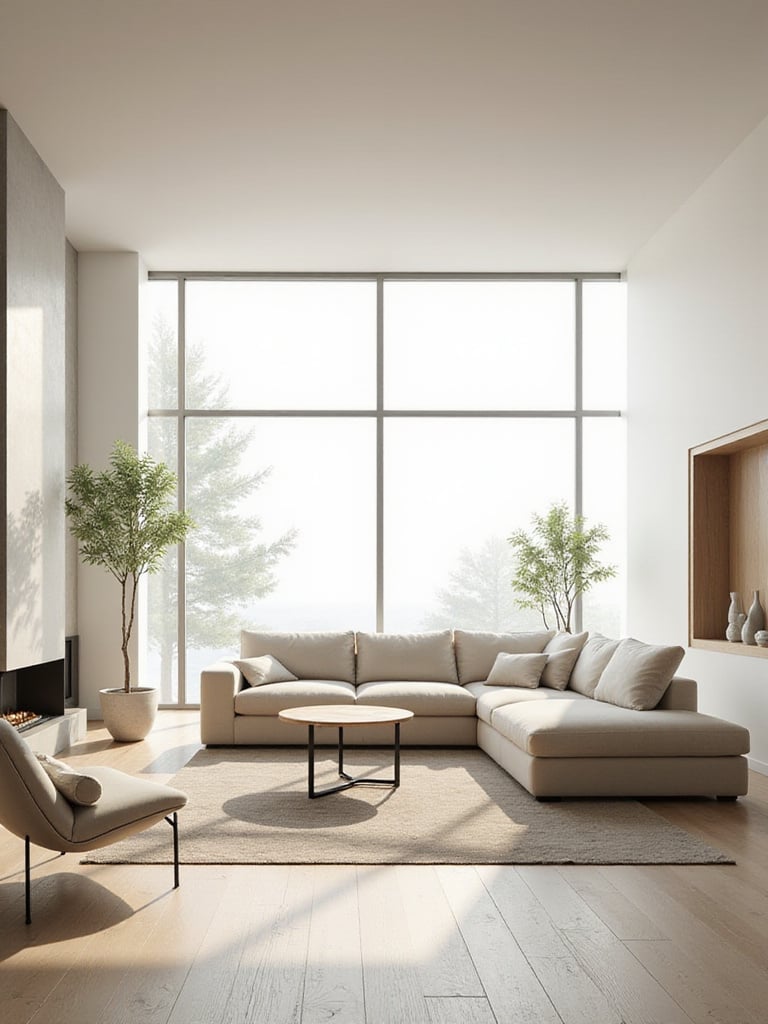
I had a client once who was struggling to find space for her morning yoga routine. We swapped her overstuffed, skirted sofa for a simple, leggy sectional. Suddenly, she didn’t just have a corner for her mat; the entire room felt more open and energetic. It’s not about stripping the room of comfort. It’s about choosing pieces that do their job without hogging all the visual and physical space. The beauty is in the balance—you get all the function without feeling crowded.
Modern design loves to tear down walls, and for good reason. Merging the living room, dining area, and kitchen into one big space creates an incredible sense of flow. It’s a game-changer for how you use your home. Light spills into every corner, making even smaller homes feel expansive and airy.
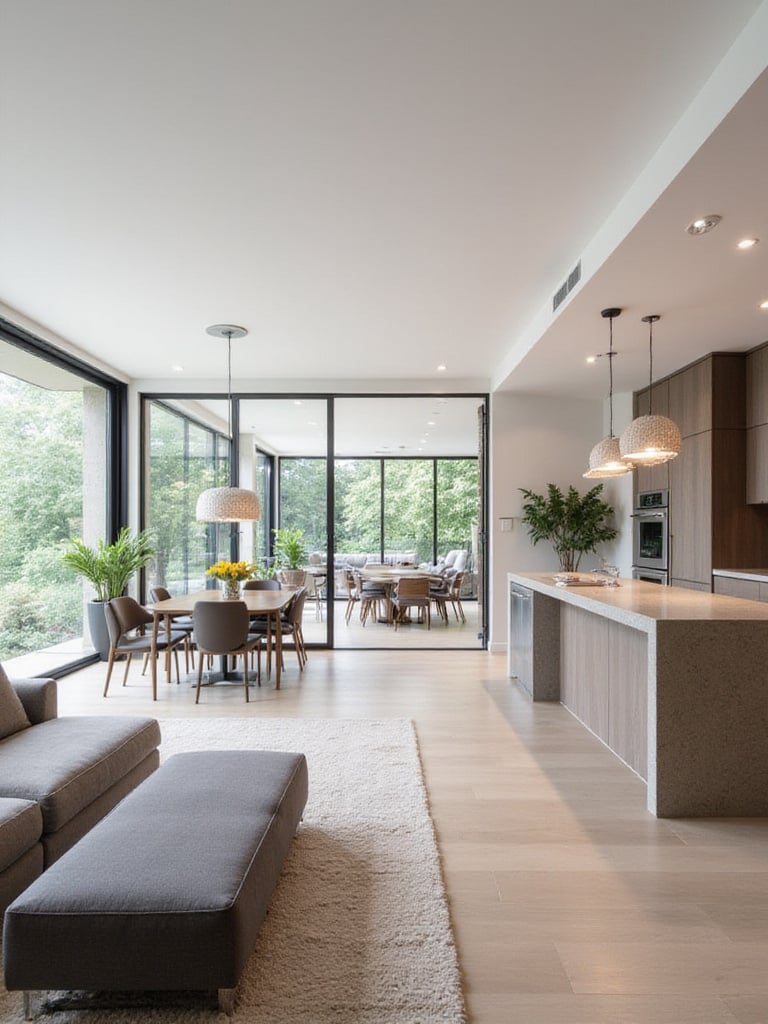
The magic here is in the flexibility. You can be prepping a healthy meal in the kitchen while still being part of the conversation or keeping an eye on the kids. For fitness, it’s golden. No more feeling boxed in. You have the freedom to move, whether it’s a family dance party or rolling out a yoga mat without rearranging the entire house. The trick is to use big Area Rugs or furniture groupings to create distinct “zones” without killing the wide-open vibe.
Walk into most truly calming spaces, and you’ll find a foundation of whites, grays, beiges, or earthy tones. This isn’t boring; it’s smart. A neutral backdrop is calming, flexible, and lets your key pieces—and your own mind—take center stage. Research consistently shows that a decluttered, organized environment can lower stress and anxiety, and a neutral palette is step one to achieving that.
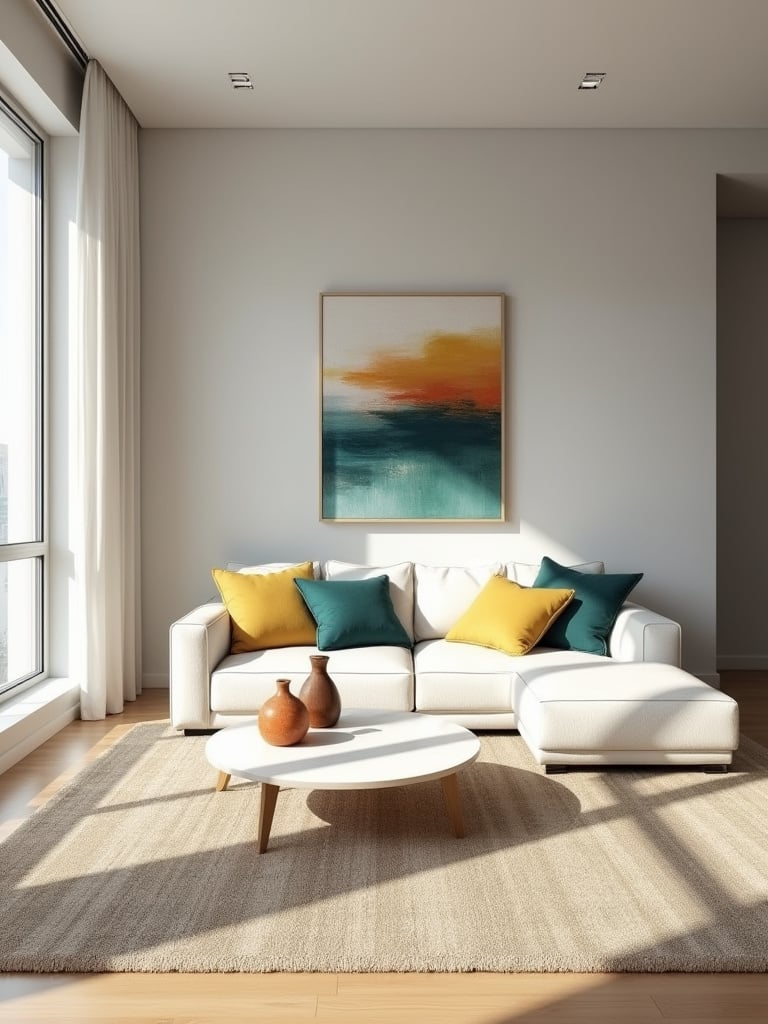
But calm doesn’t mean colorless. This is where you get strategic. Think of color like a shot of pre-workout. A bold splash of color in a throw pillow, a single statement chair, or a piece of art gives the room a jolt of energy. The trick is to be intentional. Pick one or two accent colors and use them sparingly. This controlled approach gives you that visual pop without creating the kind of chaos that distracts your focus.
Lighting is so much more than just a bulb in a socket; in a modern room, it’s functional art. A dramatic, oversized pendant light or a cool, architectural floor lamp can anchor a room all on its own. It’s one of those things that adds a ton of personality, even when it’s turned off.
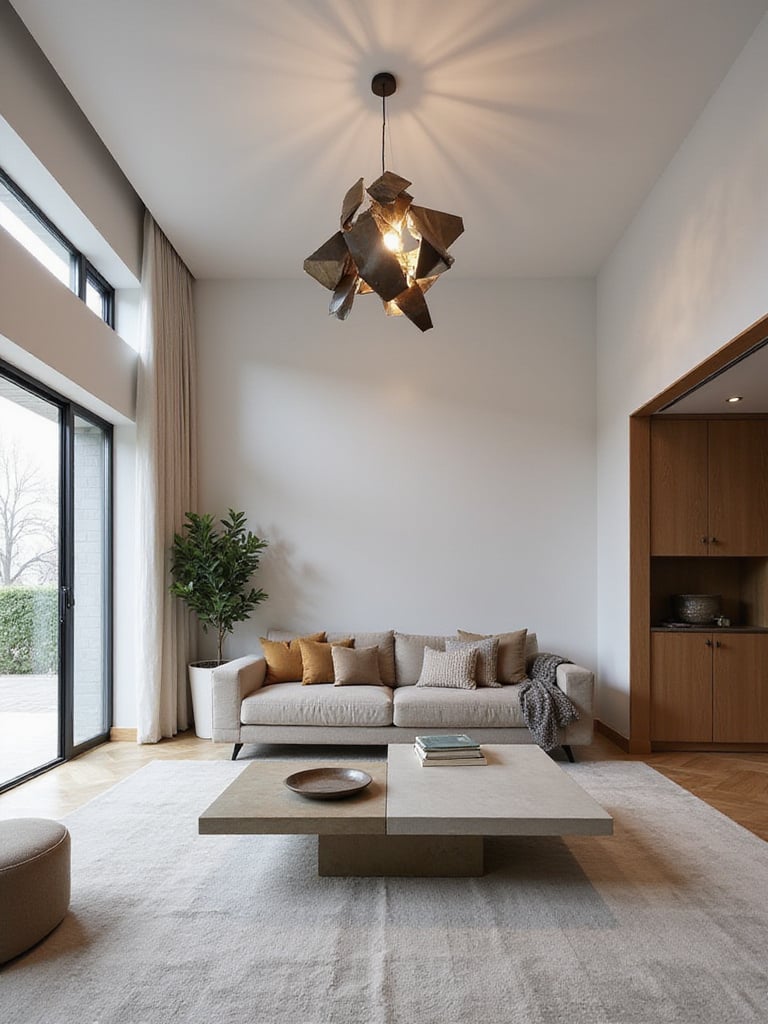 Coffee Table, showcasing clean design and effective illumination.” class=”wp-image-7907″/>
Coffee Table, showcasing clean design and effective illumination.” class=”wp-image-7907″/>Think of lighting in two ways. During the day, it’s a piece of sculpture. At night, it sets the entire mood. Good lighting can help regulate your internal clock, which is crucial for sleep and energy. So, consider the quality of the light. Do you want a warm, relaxing glow for winding down, or bright, clear light that keeps you energized? The secret here is to go big. A tiny fixture gets lost. A substantial, well-placed light becomes a true focal point that defines the entire room.
A truly modern living room is intelligent, but it doesn’t scream “tech hub.” The best technology integrates so smoothly you barely know it’s there. We’re talking about voice-activated lights that brighten as you wake up, automated blinds that open to the morning sun, and sound systems hidden in the walls or ceiling.
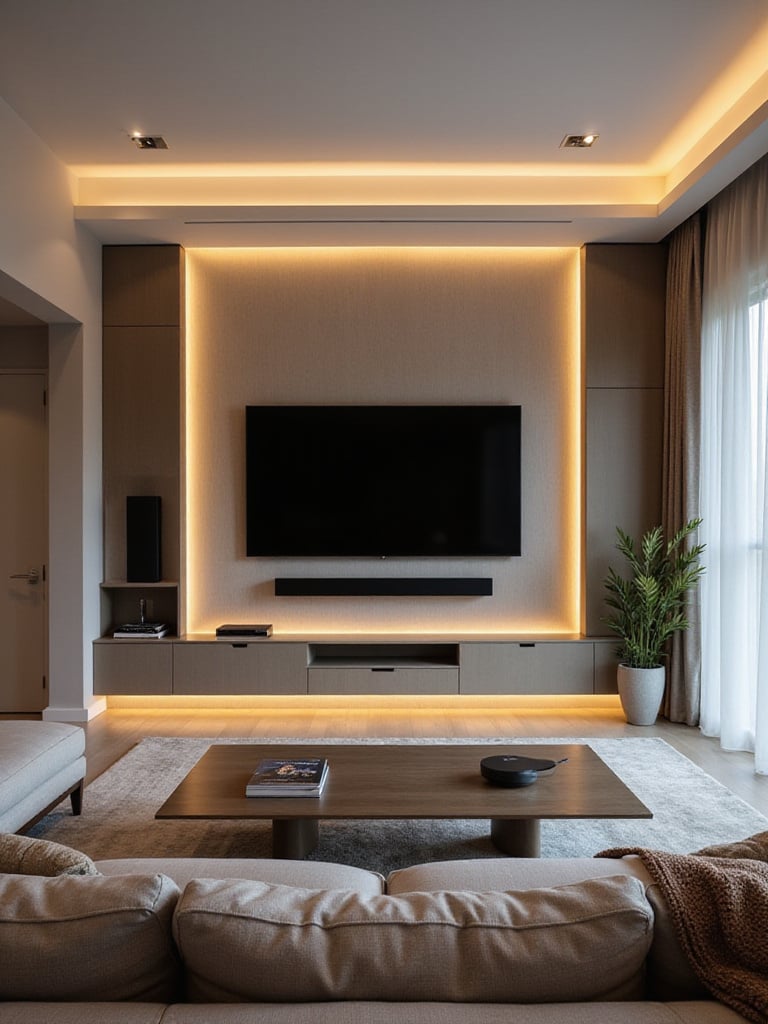
The goal is to eliminate friction and visual clutter. Wires should be hidden. Speakers should be invisible. The TV can even look like a piece of art when it’s off. It’s about making your environment serve you effortlessly. Even better, smart tech can make your home healthier. Automated blinds can maximize your exposure to mood-boosting natural light, while smart thermostats save energy, creating a home that’s as sustainable as it is comfortable.
Biophilic Design is a fancy term for our basic human need to connect with nature. And the easiest way to do that is with plants. They add life, organic shape, and texture that can stop a clean, modern room from feeling sterile. But it’s more than just looks. Plants are proven to improve air quality, reduce stress, and boost your overall sense of well-being. Honestly, for any home focused on wellness, they’re not optional.
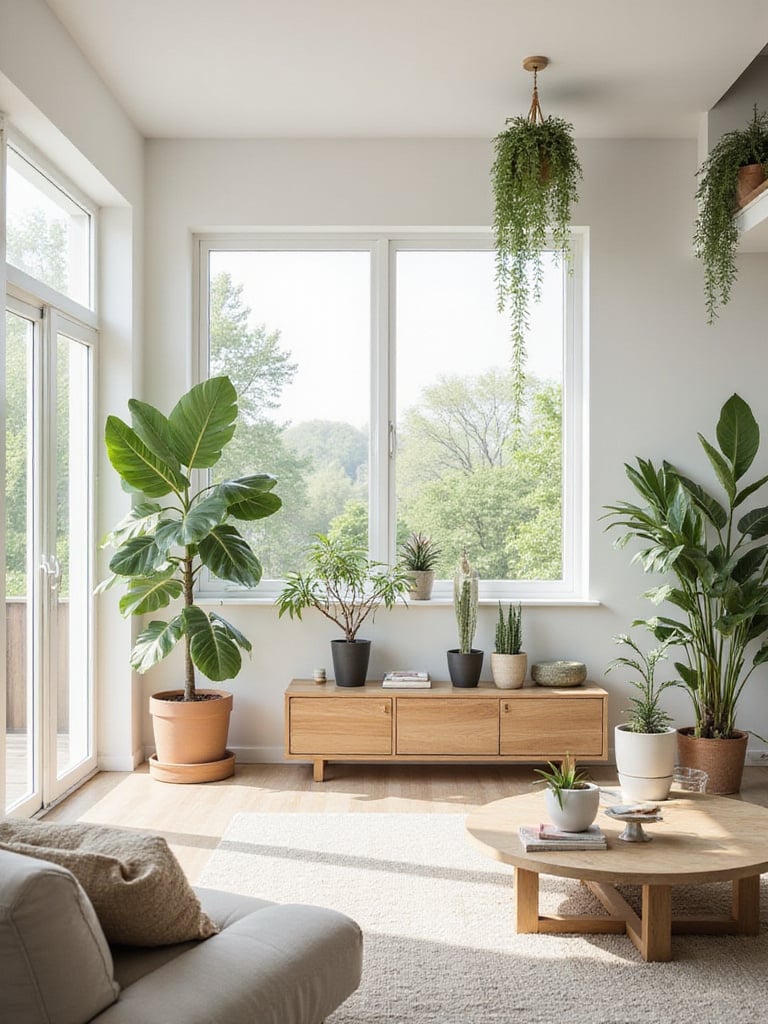
You don’t need a green thumb to make this work.
Start with one or two. The natural element immediately makes a space feel more calming and alive. It’s one of the highest-impact moves you can make.
If a room full of solid colors feels a little too sleepy for you, geometric patterns are the answer. Think bold lines, abstract shapes, and repeating forms on a rug or in a piece of art. They bring a dose of structure and visual energy that really wakes up a space without making it feel chaotic or old-fashioned.
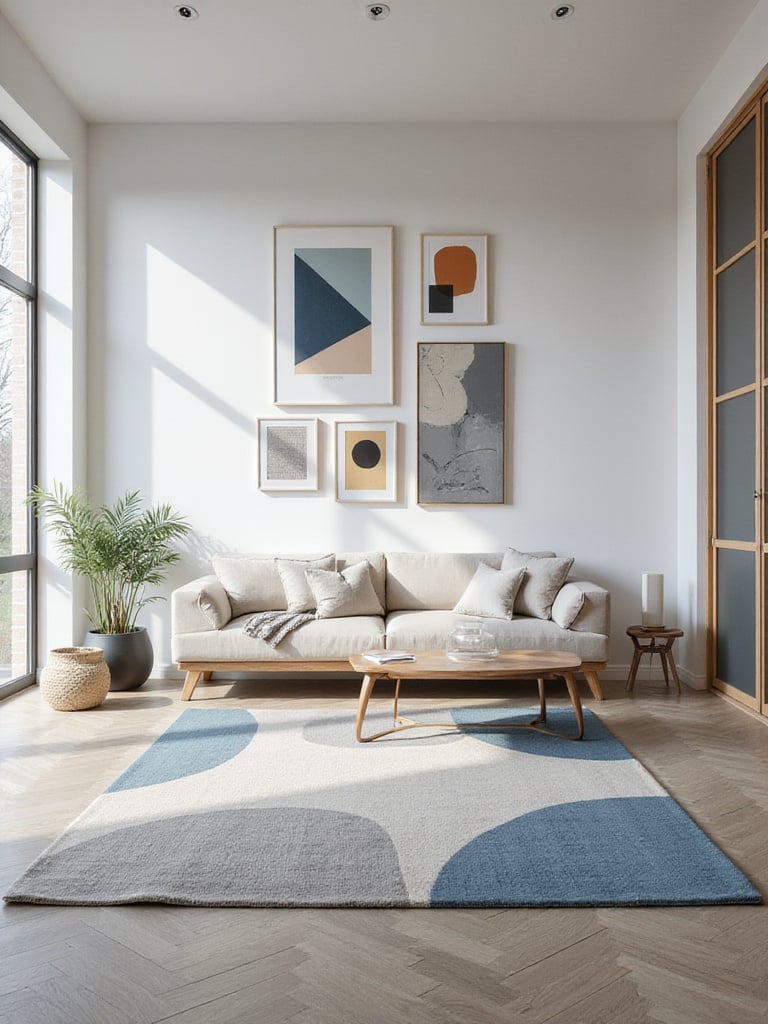
The key is to use geometry as a focal point. A large area rug with a striking pattern is a perfect way to anchor your main seating area. Or, a gallery wall of simple, geometric prints can add personality without overwhelming the eye. To keep it from getting messy, stick to your established color palette—either use different tones of your main neutrals or pull in your planned accent colors.
Here’s the secret to making a minimalist room feel inviting: texture. When your color palette is simple, you have to create interest in other ways. Mixing materials is how you do it. Imagine the feel of a nubby wool blanket on a smooth leather chair, or a plush velvet pillow against a woven linen sofa. It’s a feast for the senses.
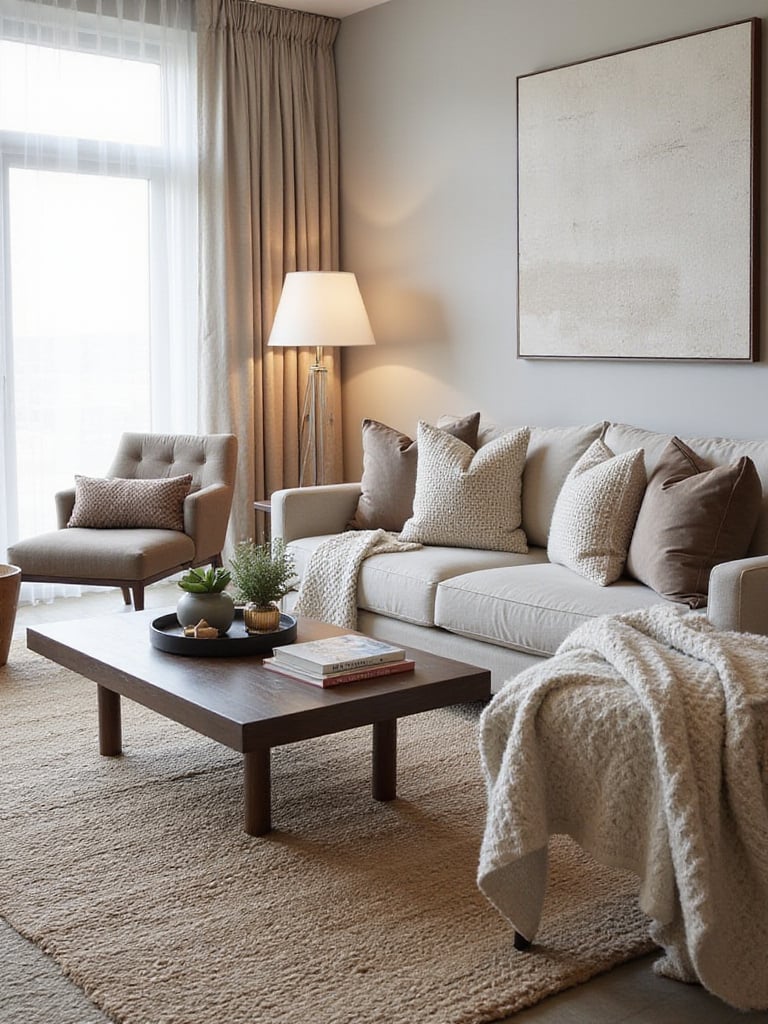
Start building your layers. A large textured piece, like a bouclé sofa or a jute rug, sets the foundation. Then add medium-sized elements—maybe a leather ottoman or a knitted pouf. Finish with the small details: ceramic vases, a metal tray, a wooden bowl. The constant interplay between rough and smooth, matte and glossy, soft and hard is what gives the room its soul. It makes you want to touch things, to settle in, and to stay.
Floating shelves are a modern design classic for a reason. They give you the storage and display space you need without the heavy, floor-hogging bulk of a traditional bookcase. By keeping the floor clear, you create an illusion of more space, which helps a room feel more open and light.
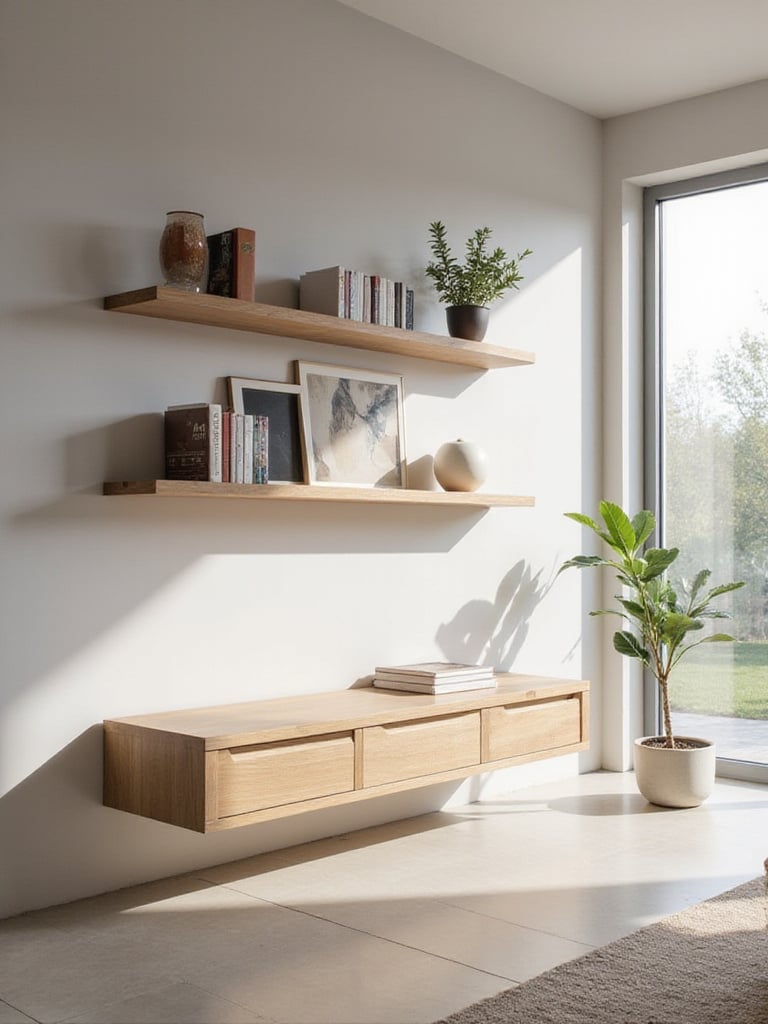
How you arrange them matters. A staggered, asymmetrical layout feels dynamic and energetic, while lining them up perfectly creates a more serene, gallery-like vibe. When you style them, mix it up. Don’t just line up books. Group a few objects of different heights and shapes, add a small plant, and leave some empty space. The goal is a curated display, not a crowded shelf.
Your life isn’t static, so why should your sofa be? Modular seating is brilliant for a modern lifestyle. It’s made up of individual pieces—corners, armless chairs, ottomans—that you can rearrange to fit whatever you’re doing.
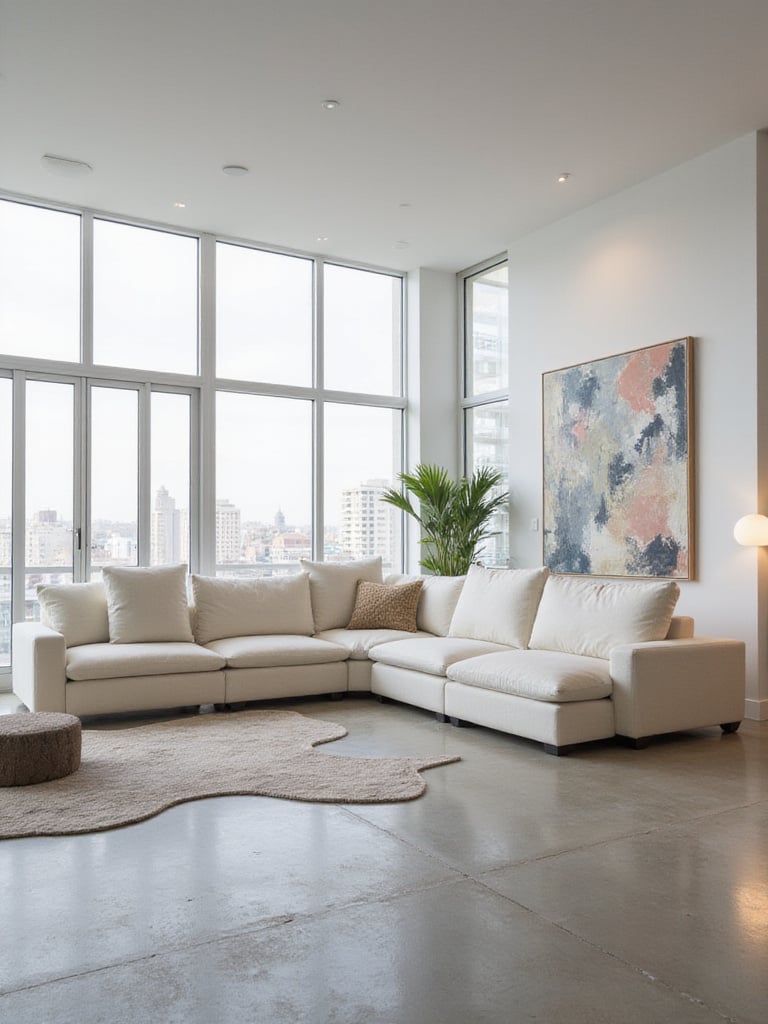
Need to host a party? Split them up into smaller conversation zones. Family movie night? Push them all together to create one giant, comfortable lounge pit. I especially love this for active families. You can easily clear a huge chunk of floor space for a workout, a VR game, or just for the kids to go wild. Look for low-profile designs in durable performance fabrics that can handle all that movement.
A common mistake I see is artwork that’s way too small for the wall it’s on. It ends up looking like an afterthought. In a modern space, art shouldn’t be an accessory; it should be a statement. A single, large-scale abstract piece can set the tone for the entire living room.
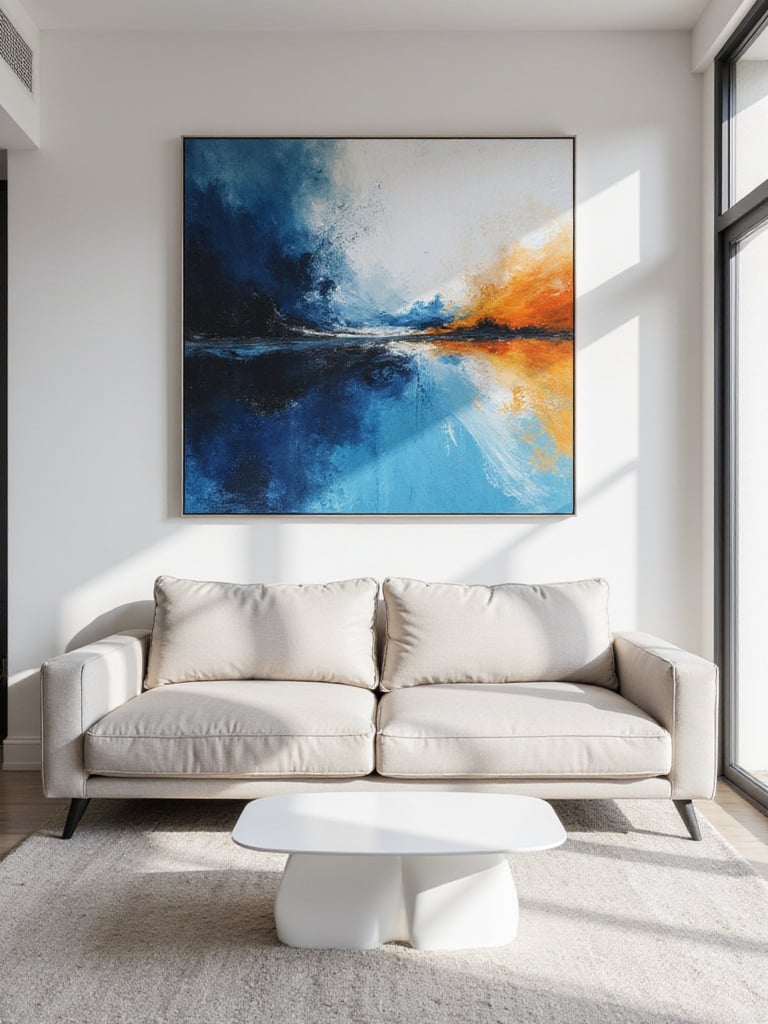
Rule of thumb: the art should take up about two-thirds of the wall space above whatever furniture it’s hanging over. Abstract art works especially well because its colors and forms add emotion and energy without telling a literal story that might compete with your clean design. Think of it as the soul of the room—it’s what gives your space a unique and personal point of view.
A room that’s too perfect can feel a bit soulless. That’s why I love tossing in some raw, industrial elements. Think a coffee table with a concrete top, a bookshelf made from reclaimed wood and steel pipes, or lighting with exposed bulbs. These materials bring texture, character, and a sense of authenticity that beautifully balances the clean, modern lines.

You don’t have to turn your home into a factory loft to get this vibe. A few strategic pieces are all it takes. The imperfections are the point. The patina on a metal frame or the unique grain of a piece of raw wood adds a layer of history and grit that you just can’t get from mass-produced items.
My personal mantra: a cluttered space equals a cluttered mind. And nothing kills a modern, calming vibe faster than… well, clutter. The key is creating storage solutions that are so well-integrated, they virtually disappear.
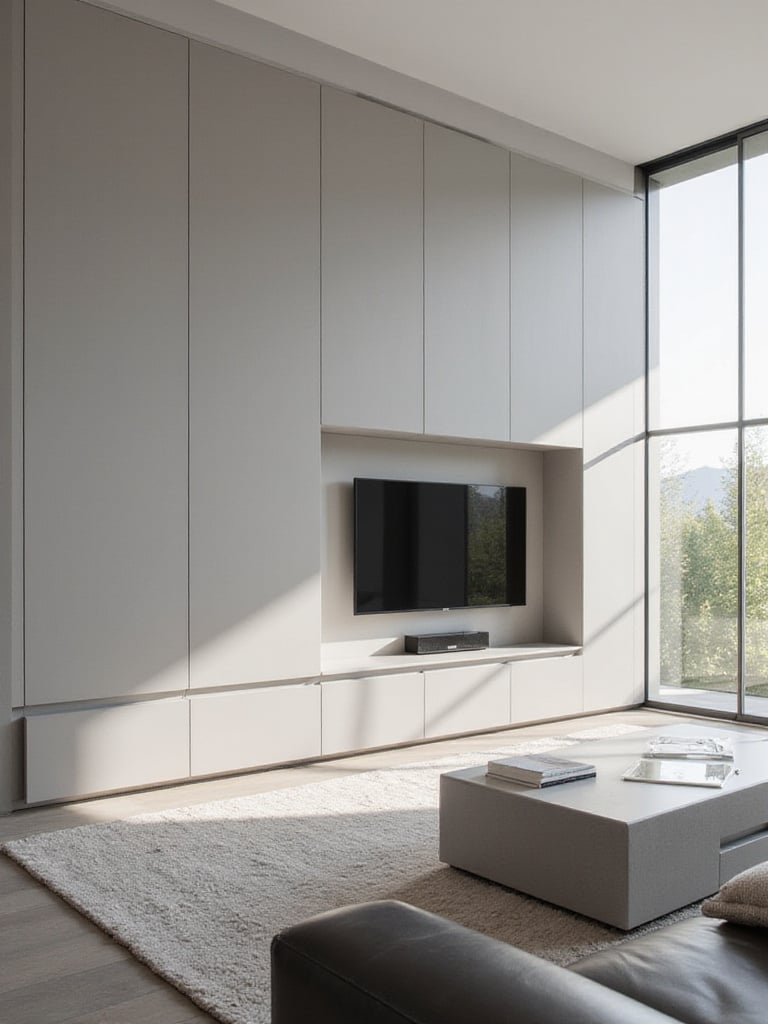
Think beyond just cabinets. An ottoman with a hidden storage compartment for blankets or workout gear. A sleek media unit designed to hide every last wire. Best of all, floor-to-ceiling built-in cabinets painted the same color as the walls. With push-to-open doors and no hardware, they just look like a clean, flat wall, but they can hide a multitude of sins. It keeps everything you need within reach but completely out of sight, preserving that serene feeling that’s so crucial for mental clarity.
In an open-concept layout, area rugs are your best friend. They’re like invisible walls that create defined zones for different activities. The rug under your sofa and chairs clearly says, “This is the conversation and relaxation zone.” You could have another defining a small reading nook or even the open space you use for your workouts.

The biggest mistake people make is buying rugs that are too small. You want the front legs of all your main furniture pieces to be sitting comfortably on the rug. This is what visually ties everything together. In modern design, you can’t go wrong with a rug that has a subtle texture or a simple geometric pattern. It defines the space without screaming for attention.
There is something deeply primal and comforting about a fireplace. It’s a natural gathering spot. But traditional fireplaces don’t always fit a modern look. Luckily, today’s options are incredible. Long, linear gas inserts, minimalist wall-mounted electric models, even ventless bioethanol fireplaces give you that mesmerizing flame without the mess.
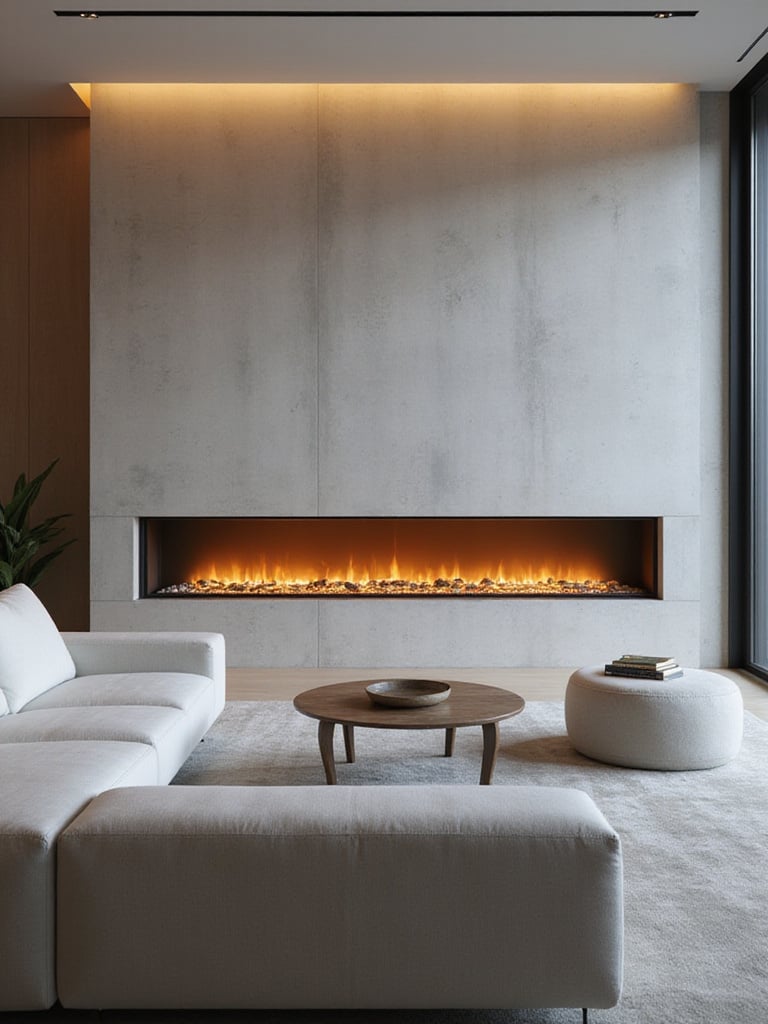
These new designs act as a stunning, dynamic focal point. Picture a long ribbon of flame set into a sleek wall of concrete or dark tile. It adds both high drama and a powerful sense of warmth. After a tough workout or a stressful day, having a spot to just sit and stare into a fire is an amazing tool for decompression.
Natural light is a powerhouse for well-being. It boosts your mood, improves your energy, and helps keep your body’s internal clock in sync. Maximizing it is one of the most impactful things you can do for your home. Floor-to-ceiling windows are the dream, of course, but even if you can’t make major architectural changes, you can amplify what you have.
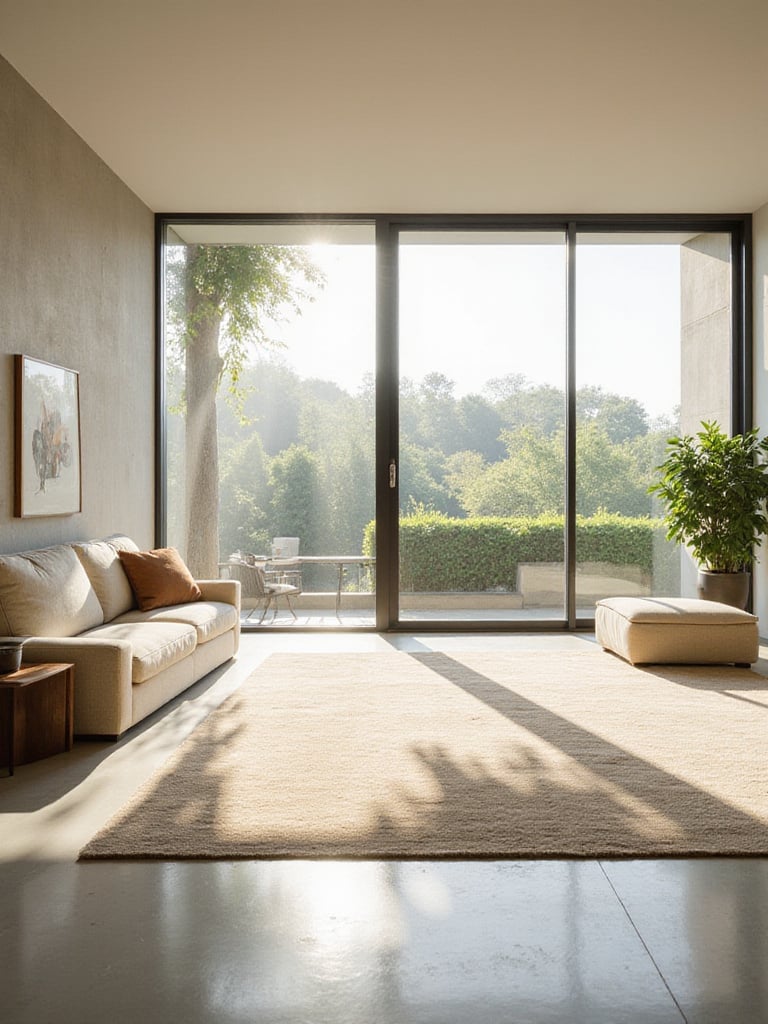
Keep your window treatments simple—think sheer blinds that offer privacy but still let light filter through. A large mirror placed opposite a window will bounce light all around the room. And don’t underestimate the power of reflective surfaces, like a glass coffee table or a high-gloss media console, to help spread that sunshine into darker corners.
We live with tech. It’s a fact. Instead of fighting a losing battle against charging cables, let your furniture handle it. You can now find awesome pieces with built-in functionality, like a side table with a wireless charging pad or a sofa with discreet USB ports hidden in the armrest.
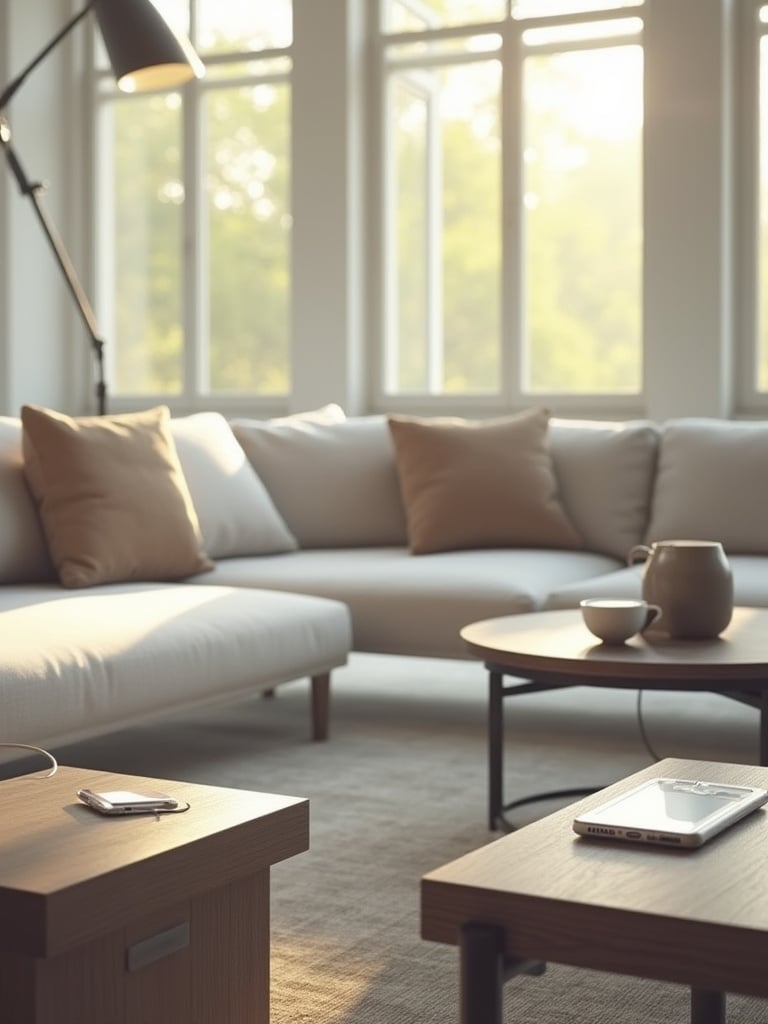
This is a perfect example of modern design—it solves a practical, everyday problem in an elegant, almost invisible way. The goal is to make your digital life easier without letting it create a visual mess. It’s a small change that removes a daily point of friction, and all those little things add up to a more peaceful space.
Every room needs at least one piece that’s there simply because you love its shape. A weirdly shaped armchair, a funky side table that looks more like a sculpture, or a coffee table with a wild, architectural base. These items break up all the straight lines and add a major dose of personality.

The key is to let that one special piece be the star. Don’t crowd it. Give it some space to be seen and appreciated. This is where you get to show off your unique style and bring a sense of movement and artistry into your everyday life. It’s form and function crashing together in the best possible way.
The choices we make for our homes can reflect a deeper commitment to wellness—not just for ourselves, but for the planet. Using sustainable materials is no longer a niche idea; it’s a core principle of good design. Look for furniture made from FSC-certified woods, rugs made from natural fibers like jute or wool, and fabrics made from recycled materials.

These eco-friendly choices often come with a bonus: character. Reclaimed wood has a story that new wood doesn’t. Natural textiles have unique textures. Opting for sustainable, non-toxic materials is a powerful way to create a home that is both beautiful and genuinely healthy to live in.
Okay, that was a lot. But here’s the main takeaway: modern design isn’t a strict set of rules. It’s a mindset. It’s about consciously creating a space that supports the life you want to live. A room that’s clean but not cold, simple but not boring, and beautiful but also incredibly functional.
Think about what drives you crazy in your current living room and start there. Is it clutter? Lack of light? No room to move? Pick the ideas that solve your biggest problems. The goal is to build a room that evolves with you, one that makes you feel energized, calm, and ready for whatever life—or your workout—throws your way.